
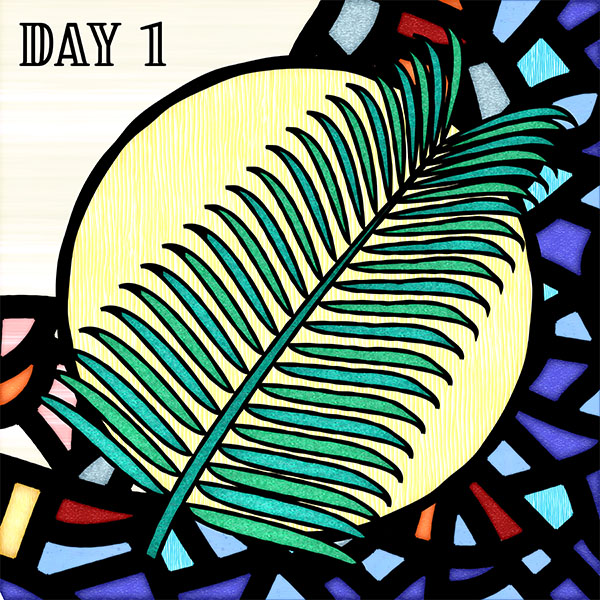

PALM SUNDAY
Suggested Reading:
Matthew 21:1-11
Mark 11:1-11
Luke 19:28-44
John 12:9-19
In true Jesus fashion, this sacred week is kicked off by Jesus telling his disciples to steal a donkey.
“The Lord has need of it.” That is what Jesus instructed the disciples to say when they would inevitably be questioned for taking a donkey for Jesus. That’s right. Jesus told His disciples they would find a donkey tied up and that they were to take it. Why? I can imagine the disciples not understanding in the slightest why Jesus asked them to do this and why Jesus needed a donkey that had never been ridden. What an unorthodox request!
Yet after three years of ministry alongside Jesus, the disciples knew that when Jesus gave instructions, even if it made no sense to them, they should obey. They gave Jesus their unequivocal yes. So they untied the donkey, responded as Jesus instructed, and Jesus rode that donkey into Jerusalem for what we call the “Triumphal Entry.”
What the disciples didn’t understand in the moment was that this was a fulfillment of prophecy. More than 500 years before the birth of Jesus, Zechariah prophesied about the coming Messiah. Zechariah 9:9, “Look, your king is coming to you. He is righteous and victorious, yet He is humble, riding on a donkey—riding on a donkey’s colt.”
Jesus sees beyond the moment. He sees the bigger picture. Even when we might not understand what He’s doing, are we willing to give Him our unequivocal yes? He is always good and worthy of our trust. When He calls us to do something big or small, let’s respond with a resounding "yes." Then step back and watch what He does with our simple obedience.
As Jesus rode into Jerusalem on the donkey, people began to lay their garments and palm branches on the road to honor Him. They shouted and sang praises to God as He passed by! In fact, their worship was so excessive that the Pharisees told Jesus to rebuke them (Luke 19:39-40). His reply? “If they keep quiet, the stones along the road would burst into cheers.”
Nothing and no one can silence the praise that belongs to Jesus. If I don’t worship, the rocks will. And I am not going to let a rock out-worship me. Jesus is worthy. He is the King! And so I will shout, sing, dance, and respond with obedience. Oh yes, even our obedience is worship!
This week, let’s focus on giving God praise in every circumstance. Thank Him for what He has done for you. If we’re going to be excessive about something, let’s be excessive in our worship to God. He gave it all for us, holding nothing back. So let’s not hold anything back in our devotion to Him. Praise God in the Highest Heaven!
Suggested Reading:
Matthew 21:1-11
Mark 11:1-11
Luke 19:28-44
John 12:9-19
In true Jesus fashion, this sacred week is kicked off by Jesus telling his disciples to steal a donkey.
“The Lord has need of it.” That is what Jesus instructed the disciples to say when they would inevitably be questioned for taking a donkey for Jesus. That’s right. Jesus told His disciples they would find a donkey tied up and that they were to take it. Why? I can imagine the disciples not understanding in the slightest why Jesus asked them to do this and why Jesus needed a donkey that had never been ridden. What an unorthodox request!
Yet after three years of ministry alongside Jesus, the disciples knew that when Jesus gave instructions, even if it made no sense to them, they should obey. They gave Jesus their unequivocal yes. So they untied the donkey, responded as Jesus instructed, and Jesus rode that donkey into Jerusalem for what we call the “Triumphal Entry.”
What the disciples didn’t understand in the moment was that this was a fulfillment of prophecy. More than 500 years before the birth of Jesus, Zechariah prophesied about the coming Messiah. Zechariah 9:9, “Look, your king is coming to you. He is righteous and victorious, yet He is humble, riding on a donkey—riding on a donkey’s colt.”
Jesus sees beyond the moment. He sees the bigger picture. Even when we might not understand what He’s doing, are we willing to give Him our unequivocal yes? He is always good and worthy of our trust. When He calls us to do something big or small, let’s respond with a resounding "yes." Then step back and watch what He does with our simple obedience.
As Jesus rode into Jerusalem on the donkey, people began to lay their garments and palm branches on the road to honor Him. They shouted and sang praises to God as He passed by! In fact, their worship was so excessive that the Pharisees told Jesus to rebuke them (Luke 19:39-40). His reply? “If they keep quiet, the stones along the road would burst into cheers.”
Nothing and no one can silence the praise that belongs to Jesus. If I don’t worship, the rocks will. And I am not going to let a rock out-worship me. Jesus is worthy. He is the King! And so I will shout, sing, dance, and respond with obedience. Oh yes, even our obedience is worship!
This week, let’s focus on giving God praise in every circumstance. Thank Him for what He has done for you. If we’re going to be excessive about something, let’s be excessive in our worship to God. He gave it all for us, holding nothing back. So let’s not hold anything back in our devotion to Him. Praise God in the Highest Heaven!
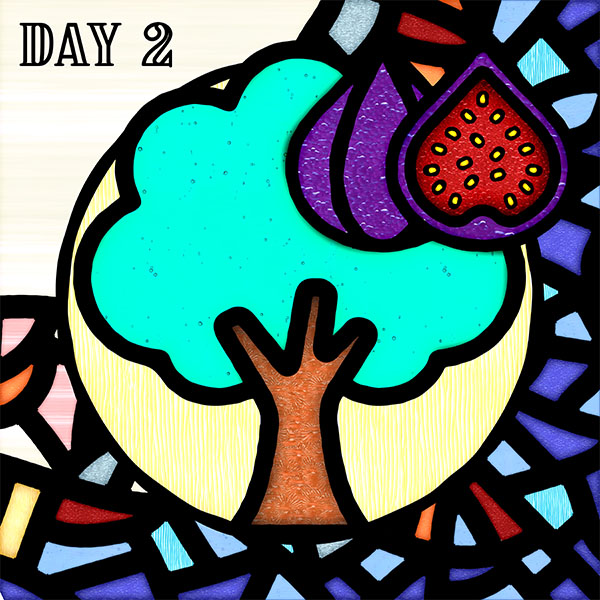

MONDAY - Jesus Holds Supreme Authority
MONDAY - Jesus Holds Supreme Authority
Suggested Reading:
Matthew 21:12-22
Mark 11:12–19
Luke 19:45–48
Now in the morning, as He returned to the city, He was hungry. And seeing a fig tree by the road, He came to it and found nothing on it but leaves, and said to it, “Let no fruit grow on you ever again.” Immediately the fig tree withered away. Matthew 21:18 ``````````
What a seemingly uncharacteristic move for Jesus to make. The one who was kind and accessible, encouraging even the children to come near now hurling a curse at a poor, fruitless fig tree. What was He trying to tell His disciples?
Fresh on the heels of flipping tables in the temple, Jesus seemed to solidify His authority to do so in His cursing of the fig tree. Jesus holds supreme authority. Heaven glorifies Him. The earth bows down to Him. Mountains move on His command. Demons tremble at His name. Fig trees wither and die at His Word.
Before ascending to the Father, Christ transferred His authority to Believers. (Luke 10:19-20) Now, as Christ-followers, it is our job to use His name to quench the fiery darts of the enemy. To walk in victory, we must take the authority that Jesus has given us and use it. We must use the name of Jesus to stop the enemy from wreaking havoc in our lives.
It is a simple but often overlooked task.
We can not fight spiritual battles with natural weapons. It is not enough to believe that the Lord is the supreme authority. You must know that you are seated at the right hand of the Father with Christ (Ephesians 2:6); and that in His name, you hold that same authority.
Suggested Reading:
Matthew 21:12-22
Mark 11:12–19
Luke 19:45–48
Now in the morning, as He returned to the city, He was hungry. And seeing a fig tree by the road, He came to it and found nothing on it but leaves, and said to it, “Let no fruit grow on you ever again.” Immediately the fig tree withered away. Matthew 21:18 ``````````
What a seemingly uncharacteristic move for Jesus to make. The one who was kind and accessible, encouraging even the children to come near now hurling a curse at a poor, fruitless fig tree. What was He trying to tell His disciples?
Fresh on the heels of flipping tables in the temple, Jesus seemed to solidify His authority to do so in His cursing of the fig tree. Jesus holds supreme authority. Heaven glorifies Him. The earth bows down to Him. Mountains move on His command. Demons tremble at His name. Fig trees wither and die at His Word.
Before ascending to the Father, Christ transferred His authority to Believers. (Luke 10:19-20) Now, as Christ-followers, it is our job to use His name to quench the fiery darts of the enemy. To walk in victory, we must take the authority that Jesus has given us and use it. We must use the name of Jesus to stop the enemy from wreaking havoc in our lives.
It is a simple but often overlooked task.
We can not fight spiritual battles with natural weapons. It is not enough to believe that the Lord is the supreme authority. You must know that you are seated at the right hand of the Father with Christ (Ephesians 2:6); and that in His name, you hold that same authority.
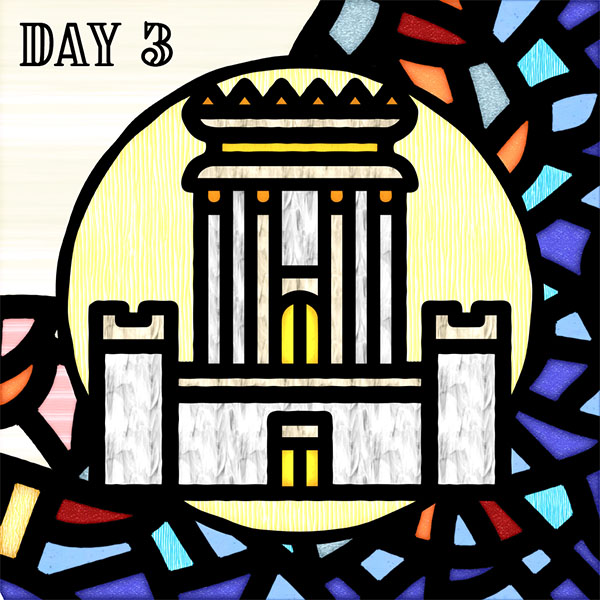

TUESDAY - Back to the Temple
Suggested Reading:
Matthew 21:23–26:5
Mark 11:27–14:2
Luke 20:1–22:2
John 12:37–50
On the heels of cursing the fig tree and flipping tables in the temple, we are now only four days away from the crucifixion and only six days away from His triumphant resurrection! Scriptures show us that on this day, Jesus headed back to the temple in Jerusalem to teach.
Jesus spent this time addressing questions from the priests and elders using parables. (A parable is simply a story used to illustrate a spiritual lesson.) Jesus often used parables to help describe heavenly concepts in a way that His followers could understand. In this particular portion of scripture, most of the parables He tells are directed toward the religious leaders.
The religious leaders in the temple had heard about Jesus. They knew who He claimed to be, but they want no part in agreeing with Him or believing what He said. They tried to trap Jesus by using scripture (which Jesus knows by heart, by the way). They challenged His authority. Jesus' response? Asking them questions and teaching through The Parable of the Two Sons, The Parable of the Tenants, and the Parable of the Wedding Banquet. They then tried to trap Him by challenging His allegiance and His belief in resurrection. They even continued to try and trap Him by asking, "What is the greatest commandment in the law of Moses?"
Jesus had an answer for every trap the Pharisees and Sadducees set for Him. He answered with grace knowing that every parable and every answer He gave would leave the religious leaders running in circles and escalate their hatred of Him. He knew what they were trying to do, and He knew what was coming.
As the scriptures continue, we find Jesus speaking to the disciples about the future—HIS future, about how He will be given over for crucifixion but after three days would rise again.
What's beautiful is that Jesus knew all that would unfold in the days leading up to His capture and crucifixion. He could have walked away when the religious leaders tried to trap Him. He could have stayed silent. Yet He chose to engage with them, even though He knew their animosity toward Him would only grow. He could see the end result—freedom and salvation for you and for me—and knew that it was all worth it.
Suggested Reading:
Matthew 21:23–26:5
Mark 11:27–14:2
Luke 20:1–22:2
John 12:37–50
On the heels of cursing the fig tree and flipping tables in the temple, we are now only four days away from the crucifixion and only six days away from His triumphant resurrection! Scriptures show us that on this day, Jesus headed back to the temple in Jerusalem to teach.
Jesus spent this time addressing questions from the priests and elders using parables. (A parable is simply a story used to illustrate a spiritual lesson.) Jesus often used parables to help describe heavenly concepts in a way that His followers could understand. In this particular portion of scripture, most of the parables He tells are directed toward the religious leaders.
The religious leaders in the temple had heard about Jesus. They knew who He claimed to be, but they want no part in agreeing with Him or believing what He said. They tried to trap Jesus by using scripture (which Jesus knows by heart, by the way). They challenged His authority. Jesus' response? Asking them questions and teaching through The Parable of the Two Sons, The Parable of the Tenants, and the Parable of the Wedding Banquet. They then tried to trap Him by challenging His allegiance and His belief in resurrection. They even continued to try and trap Him by asking, "What is the greatest commandment in the law of Moses?"
Jesus had an answer for every trap the Pharisees and Sadducees set for Him. He answered with grace knowing that every parable and every answer He gave would leave the religious leaders running in circles and escalate their hatred of Him. He knew what they were trying to do, and He knew what was coming.
As the scriptures continue, we find Jesus speaking to the disciples about the future—HIS future, about how He will be given over for crucifixion but after three days would rise again.
What's beautiful is that Jesus knew all that would unfold in the days leading up to His capture and crucifixion. He could have walked away when the religious leaders tried to trap Him. He could have stayed silent. Yet He chose to engage with them, even though He knew their animosity toward Him would only grow. He could see the end result—freedom and salvation for you and for me—and knew that it was all worth it.

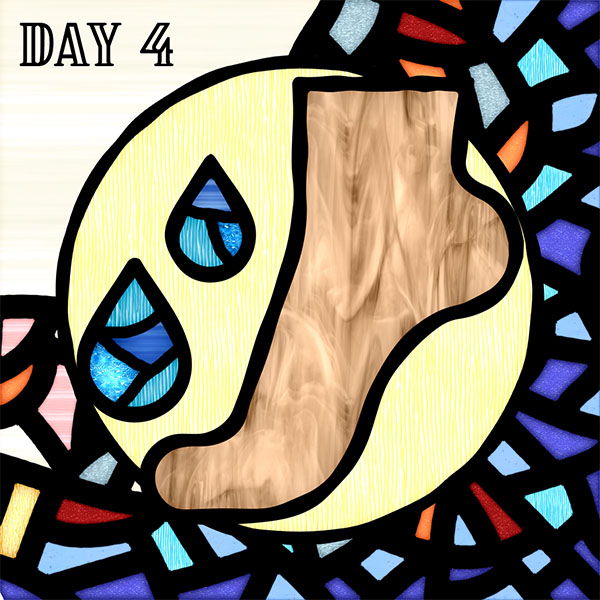
WEDNESDAY - Anointed for Burial
WEDNESDAY - Anointed for Burial
Suggested Reading:
Matthew 26:6–16
Mark 14:3–11
Luke 22:3–6
“What a waste!” The disciples were indignant about the woman’s extravagant outpouring of love to Jesus. They saw the dollars being poured out instead of the honor and sacrifice she was truly releasing. The disciples had a mere surface-level view of the situation, while the woman held a Jesus-level perspective. She didn’t see Jesus as just another person in the room, but as the only thing that mattered.
Every day, we’re tempted to view life with only our “natural” eyes. Like the disciples in that moment, we can easily take Jesus’ presence for granted. We give priority to what we want to do and accomplish and consider everything else a waste of time, effort, and resources. In reality, the only true waste in our everyday lives would be to not acknowledge Jesus, to withhold from Him all the time and attention He is due. A day without Jesus? What a waste! Jesus said in John 15:5 that apart from Him, we can do nothing; even our best efforts are worthless if they don’t include Him.
What’s interesting, is this is actually the third and final recorded time Jesus’ body was anointed in this way by different women. First, earlier in Jesus’ ministry, a sinful woman came into a Pharisee’s home to anoint Jesus’ feet with expensive perfume, wiping them with her hair and tears. Next, at Lazarus’ home in Bethany, his sister Mary again wiped Jesus’ feet with her hair and expensive perfume (six days before Passover). Lastly, only a few days later (two days before Passover), this unnamed woman we’ve read about today takes the beautiful alabaster jar of perfume and pours it out on Jesus’ head. These moments were recorded because they were significant.
Not only did this woman anoint Jesus for burial in that moment, but she will be remembered forever because of what she did. The cost of that alabaster jar was far outweighed by the legacy and example she left. It would have cost her far more to withhold her love toward Jesus. Each day, we have an important choice to make: Will we pour out our attention on His presence, or will we waste it elsewhere? Will we dare to take on a different (Divine!) view of our situations, or will we settle for what the world suggests?
When we give to God (whether in our praise, time, resources, etc.), our goal is to bless Him. Yet, the result is to Him blessing us. The more eagerly and generously we give of ourselves, the more we grow in strength, wisdom, and provision. What a good God we serve!
So consider what “sweet fragrance” of sacrifice you can pour out over Jesus today. He is our faithful, ever-present Savior, who is fully worthy of our all, and He can’t wait to meet with you.
Suggested Reading:
Matthew 26:6–16
Mark 14:3–11
Luke 22:3–6
“What a waste!” The disciples were indignant about the woman’s extravagant outpouring of love to Jesus. They saw the dollars being poured out instead of the honor and sacrifice she was truly releasing. The disciples had a mere surface-level view of the situation, while the woman held a Jesus-level perspective. She didn’t see Jesus as just another person in the room, but as the ITALICSonly thing that mattered.
Every day, we’re tempted to view life with only our “natural” eyes. Like the disciples in that moment, we can easily take Jesus’ presence for granted. We give priority to what we want to do and accomplish and consider everything else a waste of time, effort, and resources. In reality, the only true waste in our everyday lives would be to not acknowledge Jesus, to withhold from Him all the time and attention He is due. A day without Jesus? What a waste! Jesus said in John 15:5 that apart from Him, we can do nothing; even our best efforts are worthless if they don’t include Him.
What’s interesting, is this is actually the third and final recorded time Jesus’ body was anointed in this way by different women. First, earlier in Jesus’ ministry, a sinful woman came into a Pharisee’s home to anoint Jesus’ feet with expensive perfume, wiping them with her hair and tears. Next, at Lazarus’ home in Bethany, his sister Mary again wiped Jesus’ feet with her hair and expensive perfume (six days before Passover). Lastly, only a few days later (two days before Passover), this unnamed woman we’ve read about today takes the beautiful alabaster jar of perfume and pours it out on Jesus’ head. These moments were recorded because they were significant.
Not only did this woman anoint Jesus for burial in that moment, but she will be remembered forever because of what she did. The cost of that alabaster jar was far outweighed by the legacy and example she left. It would have cost her far more to withhold her love toward Jesus. Each day, we have an important choice to make: Will we pour out our attention on His presence, or will we waste it elsewhere? Will we dare to take on a different (Divine!) view of our situations, or will we settle for what the world suggests?
When we give to God (whether in our praise, time, resources, etc.), our goal is to bless Him. Yet, the result is to Him blessing us. The more eagerly and generously we give of ourselves, the more we grow in strength, wisdom, and provision. What a good God we serve!
So consider what “sweet fragrance” of sacrifice you can pour out over Jesus today. He is our faithful, ever-present Savior, who is fully worthy of our all, and He can’t wait to meet with you.

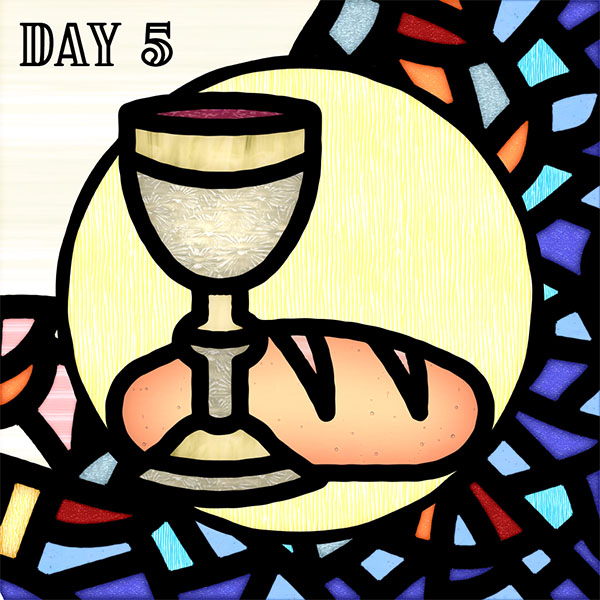
THURSDAY - The Last Supper
Suggested Reading:
Matthew 26:17–75
Mark 14:12–72
Luke 22:7–71
John 13:1–18:27
Have you ever thought about who attended The Last Supper? Or perhaps a better question is, have you ever thought about who was not in attendance at The Last Supper? If Jesus was celebrating Passover in a traditional manner, then this Last Supper would be known as a Seder. A Seder is supposed to be a special family meal. But, in the four Gospels, we see that Jesus’ biological family is not present. Rather, on what would prove to be the beginning of the end of Jesus’ earthly life, He chose to celebrate Passover by sharing a meal with the twelve men who He had done ministry with for the last 3 years. He gathered with Bartholomew, James (son of Alphaeus), Andrew, Judas Iscariot, Peter, John, Thomas, James (the Greater), Philip, Matthew, Jude Thaddeus, and Simon (the Zealot) in an upper room and had the Passover meal prepared. So, was this a traditional Passover Seder, or was it perhaps something much more significant?
The Last Supper was indeed so much more than a regular Passover Seder. The books of Matthew, Mark, and Luke paint a very clear picture of Jesus instituting a practice that we refer to as communion. Before He suffered in His body, He instructed the disciples that His body and His blood are broken and given for us. They are an outpouring of His great love for us and that those who call themselves His disciples should “eat this bread and drink this cup” until His return. Partaking in communion is something that Christians still do, to this day. However, that is not all that happened at The Last Supper.
The book of John, and this Gospel alone, tells us that Jesus “rose from supper. He laid aside His outer garments, and taking a towel, tied it around His waist. Then He poured water into a basin and began to wash the disciples' feet and to wipe them with the towel that was wrapped around Him.” It cannot be missed that at this seemingly untraditional Passover meal Jesus intentionally spent His last moments with His disciples in a way that was typically reserved for servants. This was a beautiful display of Jesus’ humility and His servanthood.
Let’s return to the initial question: have you ever thought about who attended The Last Supper? Have you considered whose feet Jesus washed? It was the feet of all twelve disciples. This means that Jesus washed the feet of His betrayer, Judas Iscariot, on the very night that he would betray Him. Yet, Jesus, knowing that Judas would betray Him, washed his feet anyway. Jesus washed the feet of the one who would deny him, not once, not twice, but three times. Still, Jesus, knowing that Peter would deny Him three times, washed his feet anyway. Jesus washed the feet of James and John who, along with Peter, could not manage to stay awake and pray with Jesus while He was suffering in the garden of Gethsemane. Jesus washed their feet anyway. Jesus washed the feet of His deserters, most of the disciples left Jesus, fleeing from the garden when He was arrested. He washed their feet anyway. Jesus saw past their worst moments, their sin, and their failings and washed their feet anyway. He was not willing to let their worst deter Him from offering them His best. This is what is offered to each of us.
Suggested Reading:
Matthew 26:17–75
Mark 14:12–72
Luke 22:7–71
John 13:1–18:27
Have you ever thought about who attended The Last Supper? Or perhaps a better question is, have you ever thought about who was not in attendance at The Last Supper? If Jesus was celebrating Passover in a traditional manner, then this Last Supper would be known as a Seder. A Seder is supposed to be a special family meal. But, in the four Gospels, we see that Jesus’ biological family is not present. Rather, on what would prove to be the beginning of the end of Jesus’ earthly life, He chose to celebrate Passover by sharing a meal with the twelve men who He had done ministry with for the last 3 years. He gathered with Bartholomew, James (son of Alphaeus), Andrew, Judas Iscariot, Peter, John, Thomas, James (the Greater), Philip, Matthew, Jude Thaddeus, and Simon (the Zealot) in an upper room and had the Passover meal prepared. So, was this a traditional Passover Seder, or was it perhaps something much more significant?
The Last Supper was indeed so much more than a regular Passover Seder. The books of Matthew, Mark, and Luke paint a very clear picture of Jesus instituting a practice that we refer to as communion. Before He suffered in His body, He instructed the disciples that His body and His blood are broken and given for us. They are an outpouring of His great love for us and that those who call themselves His disciples should “eat this bread and drink this cup” until His return. Partaking in communion is something that Christians still do, to this day. However, that is not all that happened at The Last Supper.
The book of John, and this Gospel alone, tells us that Jesus “rose from supper. He laid aside His outer garments, and taking a towel, tied it around His waist. Then He poured water into a basin and began to wash the disciples' feet and to wipe them with the towel that was wrapped around Him.” It cannot be missed that at this seemingly untraditional Passover meal Jesus intentionally spent His last moments with His disciples in a way that was typically reserved for servants. This was a beautiful display of Jesus’ humility and His servanthood.
Consider just whose feet Jesus washed. All twelve disciples. Jesus washed the feet of His betrayer, Judas Iscariot, on the very night that he would betray Him. Yet, Jesus, knowing that Judas would betray Him, washed his feet anyway. Jesus washed the feet of the one who would deny Him, not once, not twice, but three times. Still, Jesus, knowing that Peter would deny Him three times, washed his feet anyway. Jesus washed the feet of James and John, the two who along with Peter could not manage to stay awake and pray with Jesus while He was suffering in the Garden of Gethsemane. Jesus washed their feet anyway. Jesus washed the feet of His deserters; most of the disciples left Jesus, fleeing from the garden when He was arrested. He washed their feet anyway. Jesus saw past their worst moments, their sin, and their failings and washed their feet anyway. He was not willing to let their worst deter Him from offering them His best. That is what is offered to each of us. Jesus comes to whomsoever will believe in Him, seeing past our worst moments, our sin, and our failings, offering to wash our feet anyway.

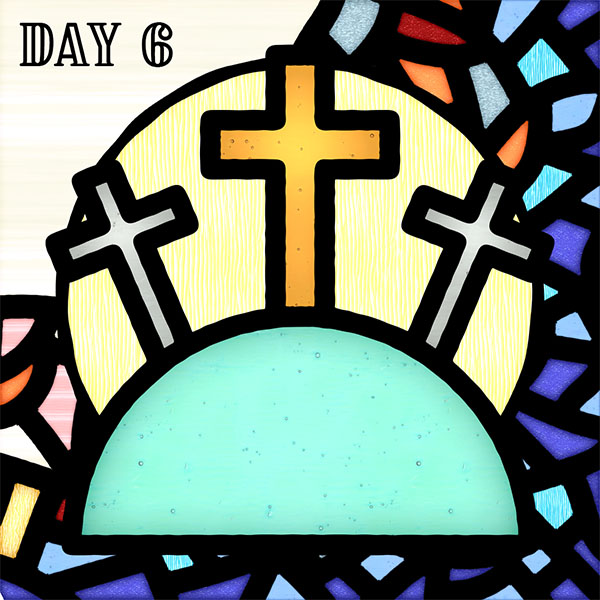
FRIDAY - The Crucifixion
FRIDAY - The Crucifixion
Suggested Reading:
Matthew 27:1–61
Mark 15:1–47
Luke 23:1–56
John 18:28–19:42
Today we reflect on the arrest, trial, and crucifixion of our Lord and Savior, Jesus Christ. Jesus was betrayed, arrested, falsely accused, beaten, scourged, denied, and crucified. And this was all part of God’s plan to bring us, you and me, into right standing with Him—forgiven and redeemed, so we would never be separated from Him for all eternity.
Jesus was fully man and fully God, and as such, He both struggled with this calling and joyfully went to the cross to die for our sins. Before His arrest, Jesus took Peter, James, and John with Him to pray in the Garden of Gethsemane. Knowing the future, Jesus was in great distress and sorrow, even falling on His face, saying, “O My Father, if it is possible, let this cup pass from Me; nevertheless, not as I will, but as You will." (Matthew 26:39) And a little while later, He again prayed, “O My Father, if this cup cannot pass away from Me unless I drink it, Your will be done." (Matthew 26:42)
Jesus knew what was coming and although it greatly distressed Him, “even to death” (Mark 14:34), He only wanted the will of the Father. And according to Hebrews 12:2, “Jesus, the author, and finisher of our faith, who for the joy that was set before Him endured the cross, despising the shame, and has sat down at the right hand of the throne of God.” I love the Passion translation says it like this: “His example is this: Because His heart was focused on the joy of knowing that you would be His, He endured the agony of the cross and conquered its humiliation, and now sits exalted at the right hand of the throne of God!”
When we think of God calling us to drink from the cup that may be difficult, do we find ourselves pleading with God to take it from us? If so, let us allow this story of Jesus’ great love to compel us to not only choose to do His will over our own, but to allow Him to minister to our hearts to see from His perspective and approach our calling with the joy set before us.
Suggested Reading:
Matthew 27:1–61
Mark 15:1–47
Luke 23:1–56
John 18:28–19:42
Today we reflect on the arrest, trial, and crucifixion of our Lord and Savior, Jesus Christ. Jesus was betrayed, arrested, falsely accused, beaten, scourged, denied, and crucified. And this was all part of God’s plan to bring us, you and me, into right standing with Him—forgiven and redeemed, so we would never be separated from Him for all eternity.
Jesus was fully man and fully God, and as such, He both struggled with this calling and joyfully went to the cross to die for our sins. Before His arrest, Jesus took Peter, James, and John with Him to pray in the Garden of Gethsemane. Knowing the future, Jesus was in great distress and sorrow, even falling on His face, saying, “O My Father, if it is possible, let this cup pass from Me; nevertheless, not as I will, but as You will." (Matthew 26:39) And a little while later, He again prayed, “O My Father, if this cup cannot pass away from Me unless I drink it, Your will be done." (Matthew 26:42)
Jesus knew what was coming and although it greatly distressed Him, “even to death” (Mark 14:34), He only wanted the will of the Father. And according to Hebrews 12:2, “Jesus, the author, and finisher of our faith, who for the joy that was set before Him endured the cross, despising the shame, and has sat down at the right hand of the throne of God.” I love the Passion translation says it like this: “His example is this: Because His heart was focused on the joy of knowing that you would be His, He endured the agony of the cross and conquered its humiliation, and now sits exalted at the right hand of the throne of God!”
When we think of God calling us to drink from the cup that may be difficult, do we find ourselves pleading with God to take it from us? If so, let us allow this story of Jesus’ great love to compel us to not only choose to do His will over our own, but to allow Him to minister to our hearts to see from His perspective and approach our calling with the joy set before us.

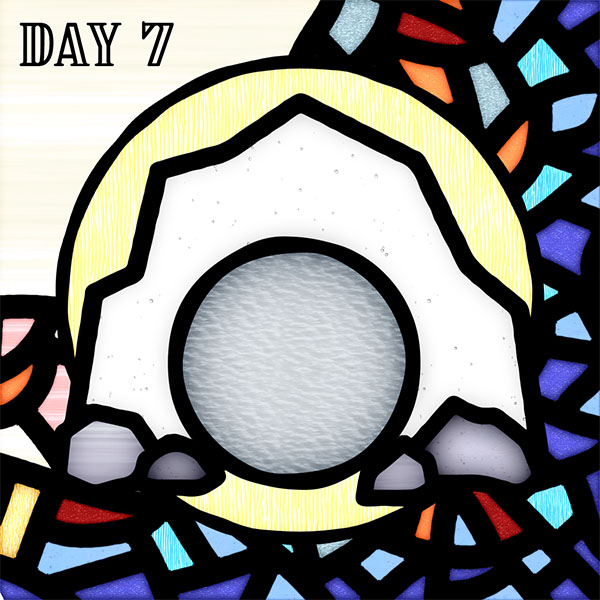
SATURDAY - In the Grave
Suggested Reading:
Matthew 27:62–66
After the flurry of events that happened in the days leading up to Jesus’ death, Saturday must have hit His followers like a brick wall. They believed He was Christ, the Son of God. Therefore, in their minds, He was invincible. How could the man they called “Lord” be in the grave? Surely they felt defeated.
Saturday was a mourning period where those close to Jesus cried out to God. Anger and confusion stirred in them because of the loss they experienced and the injustice Jesus faced. He was utterly undeserving of His punishment, and His followers must have felt as though death had the final say. Questions arose in their confused minds. Is this real? Was everything I believed a lie? How could God allow this to happen?
When pondering the Easter story, it would be easy for us to skip to Sunday in our minds because we know that there’s a happy ending to this story. But for the disciples… Saturday was very real. They were disappointed beyond their ability to comprehend. Their hopes were crushed. The unknowns left them unsure of what to do or where to turn. The long-awaited Messiah, their Rescuer, was dead.
Have you ever felt that way? Disappointed by a situation that didn’t turn out the way you planned? One that was completely contrary to everything you believed?
It’s easy to get discouraged in the middle of our story when hope seems lost and the promises of God are just beyond our reach. Instead of giving in to your feelings of despair, hold onto hope. Don’t allow yourself to wallow in self-pity. On your “Saturday,” stand up and praise Him! Why? Because we have the privilege of knowing what the disciples didn’t: HE is RISEN! Jesus conquered death and defeated the grave. Your promise will be fulfilled. Sunday morning is coming!
Suggested Reading:
Matthew 27:62–66
After the flurry of events that happened in the days leading up to Jesus’ death, Saturday must have hit His followers like a brick wall. They believed He was Christ, the Son of God. Therefore, in their minds, He was invincible. How could the man they called “Lord” be in the grave? Surely they felt defeated.
Saturday was a mourning period where those close to Jesus cried out to God. Anger and confusion stirred in them because of the loss they experienced and the injustice Jesus faced. He was utterly undeserving of His punishment, and His followers must have felt as though death had the final say. Questions arose in their confused minds. Is this real? Was everything I believed a lie? How could God allow this to happen?
When pondering the Easter story, it would be easy for us to skip to Sunday in our minds because we know that there’s a happy ending to this story. But for the disciples… Saturday was very real. They were disappointed beyond their ability to comprehend. Their hopes were crushed. The unknowns left them unsure of what to do or where to turn. The long-awaited Messiah, their Rescuer, was dead.
Have you ever felt that way? Disappointed by a situation that didn’t turn out the way you planned? One that was completely contrary to everything you believed?
It’s easy to get discouraged in the middle of our story when hope seems lost and the promises of God are just beyond our reach. Instead of giving in to your feelings of despair, hold onto hope. Don’t allow yourself to wallow in self-pity. On your “Saturday,” stand up and praise Him! Why? Because we have the privilege of knowing what the disciples didn’t: HE is RISEN! Jesus conquered death and defeated the grave. Your promise will be fulfilled. Sunday morning is coming!

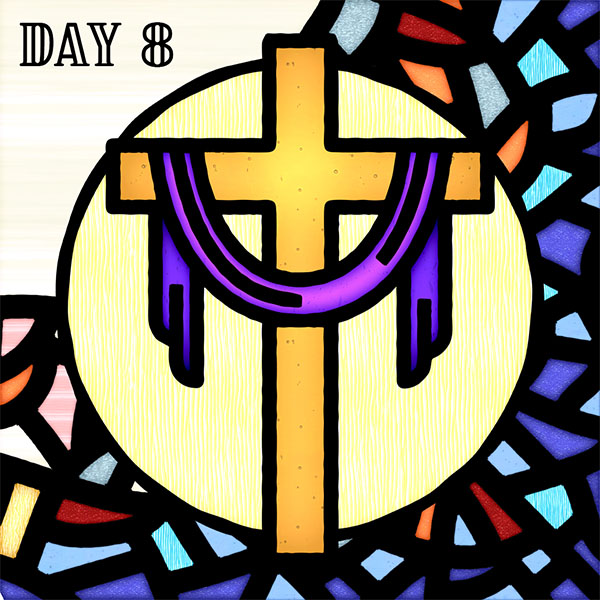
SUNDAY - He is Risen!
SUNDAY - He is Risen!
Suggested Reading:
Matthew 28:1–20
Mark 16:1–8
Luke 24:1–53
John 20:1–21:25
Jesus said to her, “Woman, why are you weeping? Whom are you seeking?” Supposing him to be the gardener, she said to him, “Sir, if you have carried him away, tell me where you have laid him, and I will take him away.” Jesus said to her, “Mary.” She turned and said to him in Aramaic (Hebrew), “Rabboni!” (which means Teacher). John 20:15-16 ESV
This is one of the most intimately touching passages in the entirety of the Bible:
A woman weeping, her heart crushed that her “Rabboni” was most brutally killed. And a hopeless, sinking feeling sets in when she thinks the body has been taken. Now she can’t even weep over His dead body and process what had happened—she’s utterly devastated.
In steps Jesus, whom she suspects to be the gardener. He knows and sees her heart. He could have been ascending to His Father; He could have been bragging all over town about rising from the dead; He could have been making His first grand appearance to His disciples. But Mary’s heart was crushed, and He attended to her before anyone else, most tenderly calling her by name.
This is the heart of God on display for us; soak in its goodness. Too many people think that God doesn’t notice them. But even when He was “busy” rising from the grave, He noticed and He stopped everything for a broken-hearted woman. Nothing has happened to us that He hasn’t noticed in detail. When our hearts have been broken, He kept every one of our tears in His bottle. When no one else on earth saw Mary crying there, Jesus didn’t miss a thing. Nothing can separate us from His love—not even death by crucifixion.
Today as we celebrate His rising from the grave, consider His heart for you. Consider what He went through to remove the shackles of sin from your life to be close to you. Meditate on His limitless love and the fact that He is the God who sees you, knows you deeply, and loves you fully. Praise Him and pour out your heart to Him like you never have before! He is risen and has come to us! Can you hear Him in your heart right now, right where you are, tenderly calling you by name?
Suggested Reading:
Matthew 28:1–20
Mark 16:1–8
Luke 24:1–53
John 20:1–21:25
Jesus said to her, “Woman, why are you weeping? Whom are you seeking?” Supposing him to be the gardener, she said to him, “Sir, if you have carried him away, tell me where you have laid him, and I will take him away.” Jesus said to her, “Mary.” She turned and said to him in Aramaic (Hebrew), “Rabboni!” (which means Teacher). John 20:15-16 ESV
This is one of the most intimately touching passages in the entirety of the Bible:
A woman weeping, her heart crushed that her “Rabboni” was most brutally killed. And a hopeless, sinking feeling sets in when she thinks the body has been taken. Now she can’t even weep over His dead body and process what had happened—she’s utterly devastated.
In steps Jesus, whom she suspects to be the gardener. He knows and sees her heart. He could have been ascending to His Father; He could have been bragging all over town about rising from the dead; He could have been making His first grand appearance to His disciples. But Mary’s heart was crushed, and He attended to her before anyone else, most tenderly calling her by name.
This is the heart of God on display for us; soak in its goodness. Too many people think that God doesn’t notice them. But even when He was “busy” rising from the grave, He noticed and He stopped everything for a broken-hearted woman. Nothing has happened to us that He hasn’t noticed in detail. When our hearts have been broken, He kept every one of our tears in His bottle. When no one else on earth saw Mary crying there, Jesus didn’t miss a thing. Nothing can separate us from His love—not even death by crucifixion.
Today as we celebrate His rising from the grave, consider His heart for you. Consider what He went through to remove the shackles of sin from your life to be close to you. Meditate on His limitless love and the fact that He is the God who sees you, knows you deeply, and loves you fully. Praise Him and pour out your heart to Him like you never have before! He is risen and has come to us! Can you hear Him in your heart right now, right where you are, tenderly calling you by name?

